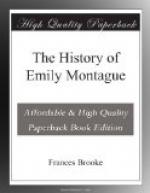If your friend wishes to please me, which I almost fancy he does, he must endeavor to resemble you; ’tis rather hard upon me, I think, that the only man I perfectly approve, and whose disposition is formed to make me happy, should be my brother: I beg you will find out somebody very like yourself for your sister, for you have really made me saucy.
I pity you heartily, and wish above all things to hear of your Emily’s marriage, for your present situation must be extremely unpleasant.
But, my dear brother, as you were so very wise about Temple, allow me to ask you whether it is quite consistent with prudence to throw yourself in the way of a woman so formed to inspire you with tenderness, and whom it is so impossible you can ever hope to possess: is not this acting a little like a foolish girl, who plays round the flame which she knows will consume her?
My mother is well, but will never be happy till you return to England; I often find her in tears over your letters: I will say no more on a subject which I know will give you pain. I hope, however, to hear you have given up all thoughts of settling in America: it would be a better plan to turn farmer in Rutland; we could double the estate by living upon it, and I am sure I should make the prettiest milk-maid in the county.
I am serious, and think we could live very superbly all together in the country; consider it well, my dear Ned, for I cannot bear to see my mother so unhappy as your absence makes her. I hear her on the stairs; I must hurry away my letter, for I don’t chuse she should know I write to you on this subject.
Adieu!
Your affectionate
Lucy
Rivers.
Say every thing for me to Bell Fermor; and in your own manner to your Emily, in whose friendship I promise myself great happiness.
LETTER 68.
To Miss Montague, at Silleri.
Montreal, Feb. 10.
Never any astonishment equalled mine, my dear Emily, at hearing you had broke an engagement of years, so much to your advantage as to fortune, and with a man of so very unexceptionable a character as Sir George, without any other apparent cause than a slight indelicacy in a letter of his mother’s, for which candor and affection would have found a thousand excuses. I will not allow myself to suppose, what is however publicly said here, that you have sacrificed prudence, decorum, and I had almost said honor, to an imprudent inclination for a man, to whom there is the strongest reason to believe you are indifferent, and who is even said to have an attachment to another: I mean Colonel Rivers, who, though a man of worth, is in a situation which makes it impossible for him to think of you, were you even as dear to him as the world says he is to you.
I am too unhappy to say more on this subject, but expect from our past friendship a very sincere answer to two questions; whether love for Colonel Rivers was the real motive for the indiscreet step you have taken? and whether, if it was, you have the excuse of knowing he loves you? I should be glad to know what are your views, if you have any. I am,




